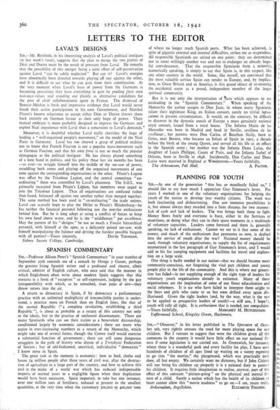SPANISH COMMENTARY
SIR,—Professor Allison Peers's "Spanish Commentary "in your number of September 25th reminds me of a remark by Ortega y Gasset, perhaps the greatest living Spanish writer and a profound and sincere, albeit critical, admirer of English culture, who once said that the manner in which Englishmen often write about modern Spain suggests that this exercise is a form of " escapism " or self-expression, judging by the gay irresponsibility with which, as he remarked, tiran pajas al aire—they throw straws into the air.
A return to democracy in Spain, if by democracy a parliamentary practice with an unlimited multiplicity of irreconcilable parties is under- stood, a practice more on French than on English lines like that of the second Republic (" a complete revolution, establishing a third Republic "), is about as probable as a return of this country not only to the ideals, but to the practice of unilateral disarmament. There are many Spaniards who can see their nation as a benevolent dictatorship, conditioned largely ba economic considerations ; there are many who aspire in ever-increasing numbers to a return of the Monarchy, which might take one of several forms, though the Crown itself would exercise a substantial function of government ; there are still some dangerous stragglers in the path of history who dream of a Trotzkyist Federation of Soviets ; but of old-fashioned, uncritical, individualist " democrats " I know none in Spain.
The great task at the moment is economic: how to feed, clothe and house 24 million people after three years of civil war, after the destruc- tion of agriculture in a large part of the country, and how to achieve this end in the midst of a world war which has reduced indispensable imports of normal years to a negligible figure when their duplication would have been necessary. Spain imported, to take but one instance, over one million tons of fertilisers, reduced at present to the smallest quantities, at the very time when the customary 300,000 t9 400,000 tons
of wheat no longer reach Spanish ports. What has been achieved, in spite of gigantic external and internal difficulties, strikes me as stupendous. All responsible Spaniards are united on one point: they are determined not to enter willingly another war and not to endanger an already. hope- ful convalescence. That the responsible Spaniards form a n-unonty, numerically speaking, is simply to say that Spain is, in this respect, like any other country in the world. Some, like myself, are convinced that the most valuable service Spain can render to Europe, and, by implica- tion, to Great Britain and to America, is this grand object of re-entering the occidental scene as a proud, independent member of the larger spiritual community.
But it is not only the interpretation of ?acts which appears to me misleading in the "Spanish Commentary." When speaking of the Monarchy the author assigns to Don Juan, in whom many Spaniards salute their legitimate King, an Italian consort, surely no trivial lapsus calami in present circumstances. It would, on the contrary, be difficult to discover in the dynastic annals of Europe a more genuinely national royal consort, issued from a royal house. The Infanta Maria de las Mercedes was born in Madrid and bred in Seville, sevillana de las sevillanas ; her parents were Don Carlos, of Bourbon . Sicily, born in Gries, near Botzen, who became an Infant of Spain in 1901, a decade before the birth of the young Queen, and served all his life as an officer in the Spanish army ; her mother was the Infanta Dona Luisa, the daughter of Louis Philippe, Count of Paris, and the Infanta Isabel of Orleans, born in Seville in 1848. Incidentally, Don Carlos and Dona Luisa were married in England at Woodnonon.—Yours faithfully,


























 Previous page
Previous page